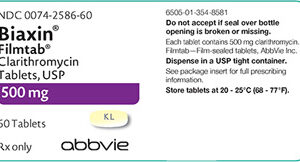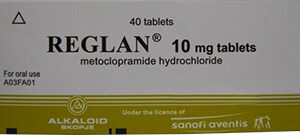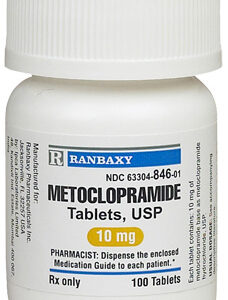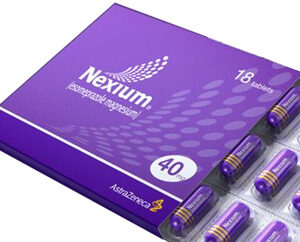Drug Name: Nexium Information
Indications and Usage
Nexium, known generically as esomeprazole, is a proton pump inhibitor (PPI) utilized primarily to treat certain stomach and esophagus issues (such as acid reflux, ulcers). It functions by reducing the amount of acid the stomach produces. This aids in alleviating symptoms such as heartburn, difficulty swallowing, and persistent cough. Nexium is also effective in promoting healing of the esophagus damaged by stomach acid (esophagitis) and can prevent gastric ulcers caused by drugs known as NSAIDs or helicobacter pylori.
Dosage and Administration
Appropriate dosage of Nexium varies based on individual needs and the condition being treated. Broadly, for GERD, the typical adult dose is 20 mg to 40 mg once daily for 4 to 8 weeks. For the maintenance of healed erosive esophagitis, 20 mg per day is the usual dose. For children, the dosage is adjusted according to weight and the specific condition. For all uses, Nexium should be consumed at least one hour before meals, preferably in the morning. The capsules should be swallowed whole with water, not crushed or chewed. Nexium is also available in sachet form for those having difficulty swallowing capsules.
Contraindications and Warnings
Patients with known hypersensitivity to any components of Nexium or to substituted benzimidazoles should not use this medication. Caution is also advised when administering it to patients with severe liver disease. Long-term use of Nexium may also carry risks of atrophic gastritis. PPIs, including Nexium, have been associated with an increased risk of osteoporosis-related fractures of the hip, wrist, or spine with long-term and multiple daily dose therapy. Concomitant use of Nexium and clopidogrel should be carefully considered due to potential interactions.
Adverse Reactions
Common adverse reactions include headache, diarrhea, nausea, flatulence, abdominal pain, constipation, and dry mouth. Acute interstitial nephritis has been observed in patients taking PPIs including Nexium. There have also been reports of hypomagnesemia, which can be serious and require magnesium replacement. An increased risk of fundic gland polyps and Clostridium difficile-associated diarrhea is noted with prolonged use.
Drug Interactions
Nexium may interact with drugs that depend on stomach pH for absorption and drugs that are metabolized by CYP2C19 enzymes, such as diazepam, citalopram, and phenytoin. Combination with certain antiretrovirals, anti-fungals, or methotrexate requires careful consideration. Additionally, concomitant use with clopidogrel should be approached with caution due to the reduction in the effectiveness of clopidogrel.
Precautions and Considerations
Monitoring magnesium levels is advised with prolonged Nexium therapy. Patients should report any clinical symptoms indicative of lupus erythematosus. Vitamin B12 levels might be impacted with long-term use. Liver function testing should be periodically conducted in patients with severe hepatic dysfunction.
Use in Specific Populations
Nexium is deemed safe for most pediatric and adult patients, yet should be used with caution in pregnant or nursing mothers. The effects on the developing fetus of a pregnant woman or infants who are breastfed are not fully known.
Overdosage and Management
In cases of overconsumption, symptomatic and supportive treatment should be initiated. There is no known specific antidote for esomeprazole overdose. Esomeprazole is extensively protein-bound and is, therefore, not readily dialyzable. The importance of contacting a poison control center or seeking immediate medical care cannot be overstated.
How Supplied/Storage and Handling
Nexium is supplied as capsules in varying strengths and as packets for oral suspension. It should be kept in a dry place at room temperature, away from excess heat and moisture. Keep this medication out of the reach of children.
Patient Counseling Information
Patients should be informed of the risk of osteoporosis-related fractures and be advised to report any lupus erythematosus symptoms. The significance of maintaining the prescribed regimen and not consuming Nexium beyond the prescribed duration without consulting the physician is paramount.
Clinical Pharmacology
Nexium is a proton pump inhibitor that inhibits gastric acid secretion. After oral administration, the onset of the antiseptic effect occurs within one hour with peak effects within two to four hours. It is absorbed in the small intestine and metabolized in the liver by the CYP2C19 enzyme system. Esomeprazole’s plasma elimination half-life is approximately 1.3 hours.
Clinical Studies
The efficacy and safety of Nexium have been established through numerous clinical trials. For the treatment of GERD and erosive esophagitis, double-blind controlled studies demonstrated significant healing and symptom resolution compared to placebo. For the reduction of NSAID-associated gastric ulcers, results showed a lower incidence of ulcers with Nexium versus placebo.
References
For a detailed account of studies, clinical trials, and comprehensive data supporting the use and safety profile of Nexium, please refer to scientific journals, Nexium’s prescribing information, and official health authority guidelines.
Medication Guide
The Medication Guide for Nexium contains important information regarding its use, potential side effects, interactions, and dosing guidelines. Patients are advised to consult this guide thoroughly before initiating therapy and to discuss any concerns with their healthcare provider.






Reviews
There are no reviews yet.